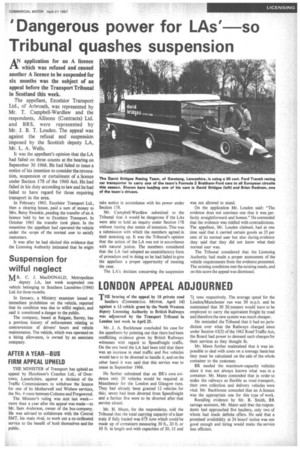'Dangerous power for LAs' so Tribunal quashes suspension
Page 39

If you've noticed an error in this article please click here to report it so we can fix it.
AN application for an A licence which was refused and caused another A licence to be suspended for six months was the subject of an appeal before the Transport Tribunal
in Scotland this week.
The appellant, Excelsior Transport Ltd., of Arbroath, was represented by Mr. T. Campbell-Wardlaw and the respondents, Allisons (Contracts) Ltd. and BRS, were represented by Mr. J. B. T. Louden. The appeal was against the refusal and suspension imposed by the Scottish deputy LA, Mr. L. A. Wells.
It was the appellant's opinion that the LA had failed on three counts at the hearing on September 30 1966. He had failed to issue a notice of his intention to consider the revocation, suspension or curtailment of a licence under Section 178 of the 1960 Act. He had failed in his duty according to law and he had failed to have regard for those requiring transport in the area.
In February 1965, Excelsior Transport Ltd., then a clearing house, paid a sum of money to Mrs. Betsy Swankie, pending the transfer of an A licence held by her to Excelsior Transport. In October 1965 the transfer took place. In the meantime the appellant had operated the vehicle under the scope of the normal user to satisfy customers.
It was after he had elicited this evidence that the Licensing Authority intimated that he might take action in accordance with his power under Section 178.
Mr. Campbell-Wardlaw submitted to the Tribunal that it would be dangerous if the LAs were able to hold an inquiry under Section 178 without issuing due notice of intention. This was a submission with which the members agreed in their summing up. It was the Tribunal's opinion that the action of the LA was not in accordance with natural justice. The members considered that the LA had adopted an unsatisfactory form of procedure and in doing so he had failed to give the appellant a proper opportunity of meeting the case.
The LA's decision concerning the suspension was not allowed to stand.
On the application Mr. Louden said: "The evidence does not convince one that it was perfectly straightforward and honest." He contended that the evidence was riddled with contradictions. The appellant, Mr. Louden claimed, had at one time said that it carried certain goods as 25 per cent of its normal user but also during evidence they said that they did not know what their normal user was.
The Tribunal considered that the Licensing Authority had made a proper assessment of the vehicle requirements from the evidence presented. The existing conditions met the existing needs, and on this score the appeal was dismissed.




































































































































